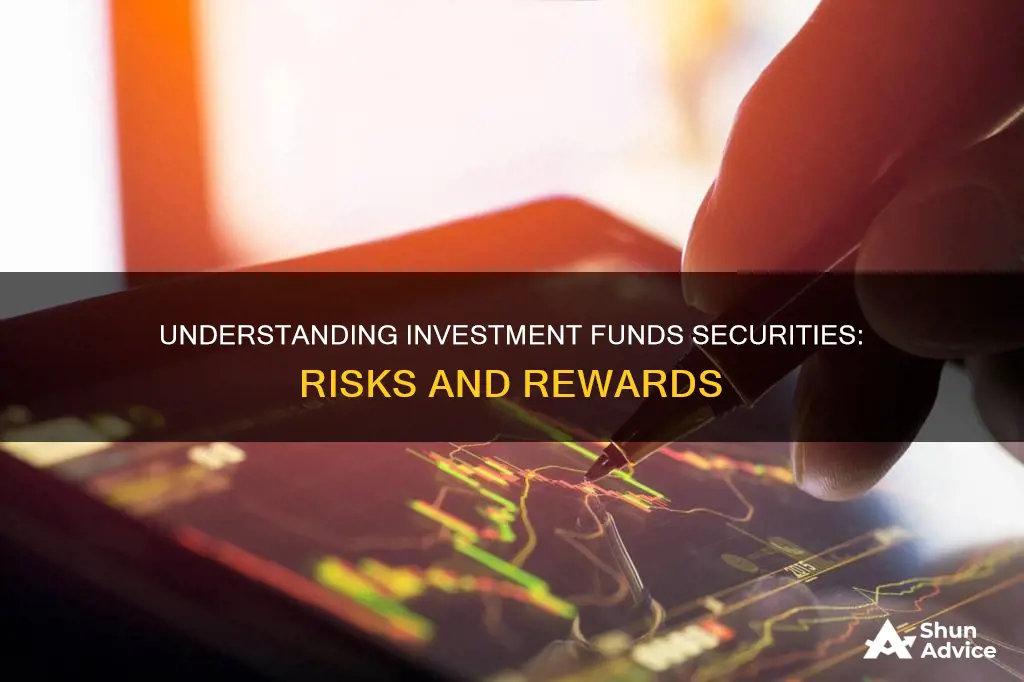
Investment fund securities are a type of security, or tradable financial asset, that are purchased with the intention of holding them for investment. Investment funds are a supply of capital belonging to numerous investors, used to collectively purchase securities. Investment funds are managed by professional money managers and provide investors with access to a wide mix of assets. There are several types of investment funds, including mutual funds, exchange-traded funds (ETFs), money market funds, and hedge funds.
| Characteristics | Values |
|---|---|
| Definition | Tradable financial assets, purchased with the intention of holding them for investment purposes |
| Types | Equity securities, debt securities, derivatives, money market securities |
| Equity Securities | Common stocks, mutual funds, ETFs |
| Debt Securities | Government and corporate bonds, banknotes, debentures, deposits, notes, commercial paper |
| Derivatives | Forwards, futures, options, swaps |
| Money Market Securities | Commercial paper, repurchase agreements, negotiable certificates of deposit, bankers' acceptances, federal funds |
| Governance | Article 8 of the Uniform Commercial Code (UCC) |
| Purchasers | Individuals or institutions |
| Purpose | Diversification, capital appreciation, income generation, collateral |
| Risks | Market volatility, credit risk, interest rate risk |
What You'll Learn

Investment funds are a supply of capital from multiple investors, used to collectively purchase securities
Investment funds are managed by professional money managers who trade on exchanges. The funds are defined by the portfolio of investments funded by all the investors who have purchased shares in the fund. When an individual buys shares in an investment fund, they gain part-ownership of all the underlying assets the fund owns. The fund's performance depends on how its collective assets are doing. When these assets increase in value, so does the value of the fund's shares. Conversely, when the assets decrease in value, so does the value of the shares.
Investment funds are subject to governance and regulations to ensure accountability and fairness for investors. Investment funds can be open-end or closed-end. The majority of investment fund assets belong to open-end funds, which issue new shares as investors add money to the pool and retire shares as investors redeem. These funds are typically priced just once at the end of the trading day. Closed-end funds trade more similarly to stocks and are managed investment funds that issue a fixed number of shares and trade on an exchange.
Securities are fungible and tradable financial instruments used to raise capital in public and private markets. They can be broadly categorized into three types: equity, debt, and hybrids. Equity provides ownership rights to holders, debt is essentially loans repaid with periodic payments, and hybrids combine aspects of debt and equity.
Examples of securities include stocks, bonds, investment contracts, notes, and derivatives.
A Guide to Investing in SBI Nifty Index Fund
You may want to see also

Investment funds can be broad-based or tightly focused
Investment funds are a supply of capital from multiple investors, used to collectively purchase securities. They are often managed by a professional fund manager and can be broad-based or tightly focused.
Broad-based investment funds are typically index funds that track a specific market index, like the S&P 500. These funds are designed to mirror the performance of the index by holding the same stocks in the same proportions. For example, an S&P 500 index fund will hold the 500 companies that make up the index.
Tightly focused investment funds, on the other hand, invest in a limited number of securities, often within a specific sector or industry. For example, a focused fund might invest only in small technology stocks or renewable energy companies. These funds are also known as focused mutual funds or focused equity funds.
Focused funds usually hold 20 to 30 different securities, while traditional mutual funds may hold 50 or more, providing greater diversification. Focused funds are therefore more dependent on the performance of each individual security and tend to be more volatile.
Focused funds can be attractive to investors who want more control over their investments and want to avoid certain sectors or industries that conflict with their personal values. They also offer the potential for higher returns if the selected securities perform well. However, the lack of diversification means focused funds carry more risk, and a single sector's losses can result in massive losses for the investor.
When choosing between broad-based and tightly focused investment funds, investors should consider their investment goals, risk tolerance, and time horizon. Broad-based funds offer more diversification and are generally lower risk, while focused funds provide the potential for higher returns but with greater volatility and risk.
Strategies to Attract Investors to Your Fund
You may want to see also

Investment funds are subject to fees
Investment funds are indeed subject to fees, and these fees can vary depending on the type of fund and the provider. Some common fees associated with investment funds include:
- Management fees: These are fees paid to the fund's investment adviser or manager for overseeing the fund's portfolio and making investment decisions. Management fees are typically calculated as a percentage of the fund's average net assets and can vary depending on the fund's size and complexity.
- Expense ratios: This is an annual fee that covers the fund's operating expenses, including management fees, administrative costs, and marketing expenses. The expense ratio is also expressed as a percentage of the fund's average net assets.
- Sales charges or loads: Some investment funds charge sales fees, known as "loads", when investors buy or sell shares. Front-end loads are charged when purchasing shares, while back-end or deferred sales loads are assessed if shares are sold before a certain date.
- Redemption fees: Some funds charge a fee when investors sell their shares within a short period (usually 30 to 180 days after purchasing them). Redemption fees are designed to discourage short-term trading and maintain stability in the fund.
- Transaction fees: These are fees associated with the buying and selling of securities within the fund. They can include brokerage fees, trading fees, and other costs related to executing trades.
- Account fees: Some funds may charge additional fees for maintaining investor accounts, especially if the account balance falls below a certain minimum. These can include account maintenance fees or other administrative charges.
It's important for investors to carefully consider and compare the fees associated with different investment funds, as these fees can significantly impact their overall investment returns. While minimising fees is generally advisable, it's also essential to evaluate the services and potential returns offered by the fund to make an informed decision.
Fidelity Money Market Fund: A Smart Investment Strategy?
You may want to see also

Investment funds are managed by fund managers
Fund managers can be individuals or a team of people, and they are generally highly educated with relevant professional credentials and management experience. They are well-versed in business, mathematics, and people management. Their primary duties include meeting with their team and clients, researching companies and the financial industry, and staying up-to-date on market trends to make informed decisions.
When it comes to investment funds, fund managers are responsible for developing and refining the investment strategy, taking into account the fund's objectives, risk tolerance, and market conditions. They conduct thorough research and analysis of financial markets, economic trends, and individual securities to make informed investment choices. This includes deciding when to buy or sell assets to optimise returns and manage risk.
Fund managers also play a crucial role in monitoring the fund's performance and ensuring it is on track to meet its objectives. They are responsible for reporting the fund's performance to clients and potential investors, as well as addressing inquiries and concerns. Additionally, fund managers must ensure compliance with relevant financial regulations and legal requirements, such as reporting and disclosure obligations.
The role of a fund manager can be further categorised into active and passive management. Active fund managers aim to outperform their peers and benchmark indexes by constantly changing their holdings based on market research and analysis. On the other hand, passive fund managers mirror the returns of a benchmark index by applying the same weighting in their portfolio. Passive fund management is often associated with exchange-traded funds (ETFs) and index mutual funds, while active fund management is more common in mutual funds and typically comes with higher fees.
Overall, fund managers are essential to the success of investment funds. Their expertise and decision-making skills guide the fund's performance, providing investors with peace of mind that their investments are in capable hands.
A Beginner's Guide to Index Funds on Webull
You may want to see also

Investment funds can be open-end or closed-end
Investment funds are a supply of capital from multiple investors, used to collectively purchase securities. Investment funds can be open-end or closed-end.
Open-end funds, such as most mutual funds and exchange-traded funds (ETFs), do not have a fixed number of shares and are offered through a fund company that sells shares directly to investors. There is no limit to how many shares an open-end fund can offer, and new shares are issued whenever an investor buys them. Open-end funds are priced only once per day and can usually be purchased directly through the fund's sponsoring investment company.
Closed-end funds, on the other hand, issue a fixed number of shares through an initial public offering (IPO) and trade on an exchange. The fund's shares can be bought and sold on a stock exchange, but no new shares will be created, and no new money will flow into the fund. Closed-end funds are usually actively managed and tend to concentrate on a single industry, sector, or region. They are priced based on investor supply and demand and can trade at a premium or discount to their net asset value (NAV).
Both open-end and closed-end funds are professionally managed and provide investors with a diversified portfolio of securities. The main differences lie in their structure, pricing, and sales. Open-end funds are more flexible in terms of share issuance and are priced based on the fund's net asset value. In contrast, closed-end funds have a fixed number of shares and are traded on exchanges, with prices determined by supply and demand.
BPI Mutual Fund Investment: A Step-by-Step Guide
You may want to see also
Frequently asked questions
Investment fund securities are a type of security that represents ownership in an investment fund. An investment fund is a supply of capital from multiple investors, used to purchase a wide range of securities, while each investor retains ownership and control of their shares.
Examples of investment fund securities include mutual funds, exchange-traded funds (ETFs), money market funds, and hedge funds.
Investment fund securities offer a broader selection of investment opportunities, greater management expertise, and lower investment fees than individual investors may be able to obtain on their own. They also provide professional management, diversification, and affordability.







